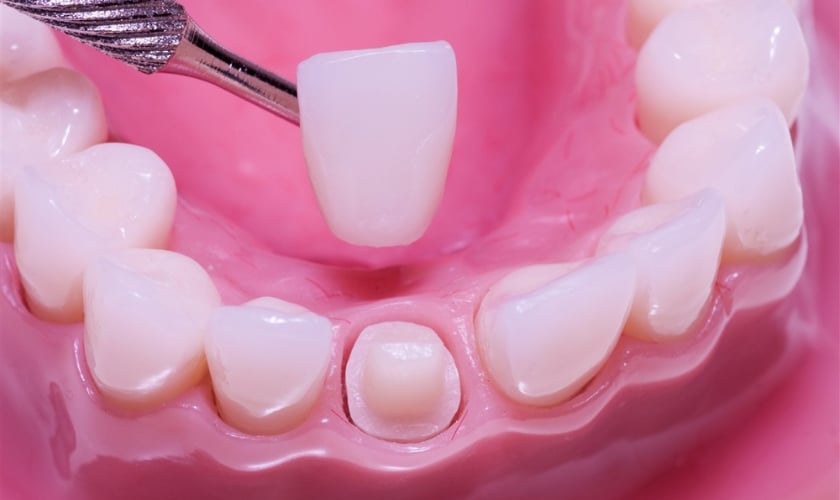
A dental crown is a significant investment in your oral health. It restores the function, strength, and aesthetics of a damaged or decayed tooth. But just like any dental work, a crown requires proper care to ensure its longevity and effectiveness.
This comprehensive guide dives deep into essential tips on how to take care of your new dental crown. We’ll cover everything from proper brushing and flossing techniques to dietary considerations and habits to avoid. By following these tips, you can ensure your crown functions flawlessly and contributes to a healthy, beautiful smile for years to come.
Understanding Dental Crowns
Dental crowns are tooth-shaped caps that are permanently cemented onto a damaged or decayed tooth. They are typically made from durable materials like porcelain or metal fused with porcelain, offering superior strength and aesthetics compared to natural teeth.
Crowns are used for various purposes, including:
- Restoring a severely damaged or decayed tooth
- Strengthening a cracked or fractured tooth
- Supporting a large filling
- Anchoring a dental bridge
- Covering a dental implant
While crowns are incredibly strong and resilient, they are not invincible. With proper care, however, they can last for many years.
Essential Tips for New Dental Crown Care
Here are some key practices to ensure the longevity and functionality of your new dental crown:
1. Practice Excellent Oral Hygiene:
- Brushing: Brush your teeth twice daily with a soft-bristled toothbrush and fluoride toothpaste. Pay extra attention to the area around the crown, using a gentle circular motion to clean the gum line and the crown itself.
- Flossing: Flossing daily is essential to remove plaque and food particles that can accumulate around the crown and contribute to gum disease or decay under the crown. Consider using a floss threader for easier flossing around the crown.
- Consider Antiseptic Mouthwash: Using an antiseptic mouthwash along with brushing and flossing can provide additional benefits by reducing plaque and bacteria around the crown. Consult your dentist for a recommended mouthwash.
2. Mind Your Diet:
- Avoid Hard Foods: Hard foods like nuts, hard candies, and ice cubes can put excessive strain on your crown and potentially cause it to crack or chip.
- Chew with Caution: Avoid chewing on hard or chewy foods, such as tough meat, with the crowned tooth. Distribute chewing pressure across your entire mouth for balanced wear.
- Sticky Foods: While occasional sticky candy won’t cause major issues, try to limit your intake of sticky foods like caramel or gummy candies to prevent them from getting lodged around the crown and potentially causing problems.
3. Break Bad Habits:
- Don’t Use Your Teeth as Tools: Avoid using your teeth for anything other than chewing food. This includes opening packages, biting your nails, or crunching on ice. These actions can damage your crown or natural teeth.
- Bruxism (Teeth Grinding): If you grind or clench your teeth at night (bruxism), talk to your dentist about getting a night guard. Bruxism can exert excessive force on your crown and lead to damage.
4. Regular Dental Checkups:
- Schedule Regular Appointments: Regular dental checkups (every 6 months) allow your dentist to monitor the health of your crown, check for any signs of wear or tear, and address any potential issues early on.
5. Additional Tips:
- Avoid Excessive Staining: While your crown is resistant to staining like natural teeth, certain beverages like coffee, red wine, or dark berries can stain the crown over time. Brush your teeth after consuming these beverages to minimize staining.
- Sudden Sensitivity: If you experience sudden sensitivity to hot or cold after getting a crown, it might be a sign of irritation or inflammation. Contact your dentist to determine the cause and address the issue.
- Loose Crown: If your crown feels loose or comes off completely, contact your dentist immediately. Don’t attempt to re-cement the crown yourself.
Benefits of Proper Crown Care
By following these tips for taking care of your new dental crown, you can reap several benefits:
- Longevity: Proper care ensures your crown lasts for many years, maximizing your investment in your oral health.
- Reduced Risk of Complications: Good crown care minimizes the risk of complications like chipping, cracking, decay under the crown, or gum disease around the crown. This saves you from the need for costly repairs or replacements.
- Improved Oral Health: Maintaining a clean and healthy environment around your crown promotes overall oral health and prevents issues like gum disease and tooth decay.
- Confidence and Appearance: A well-maintained crown looks and functions naturally, contributing to a confident smile and a positive self-image.
When to See Your Dentist About Your Crown
While proper care is essential, there are situations where you might need to see your dentist sooner than your next checkup. Here are some signs to watch out for:
- Pain or Sensitivity: If you experience persistent pain or sensitivity around the crowned tooth, it could indicate an underlying issue like inflammation or infection.
- Chipped or Cracked Crown: A chipped or cracked crown needs immediate dental attention to prevent further damage or potential loss of the crown.
- Loose Crown: If your crown feels loose or comes off completely, contact your dentist right away. Don’t attempt to re-cement the crown yourself.
- Gum Recession Around the Crown: Receding gums can expose the root surface of the tooth under the crown, increasing the risk of decay. See your dentist to address this issue.
Taking care of your new dental crown is an investment in your oral health and overall well-being. By following the tips and guidelines outlined in this blog, you can ensure your crown serves you well for many years to come. Remember, a healthy smile starts with good oral hygiene practices and regular dental checkups.
If you have any questions or concerns about your new dental crown, don’t hesitate to contact your dentist. They can provide personalized advice and ensure your smile remains beautiful and healthy.
